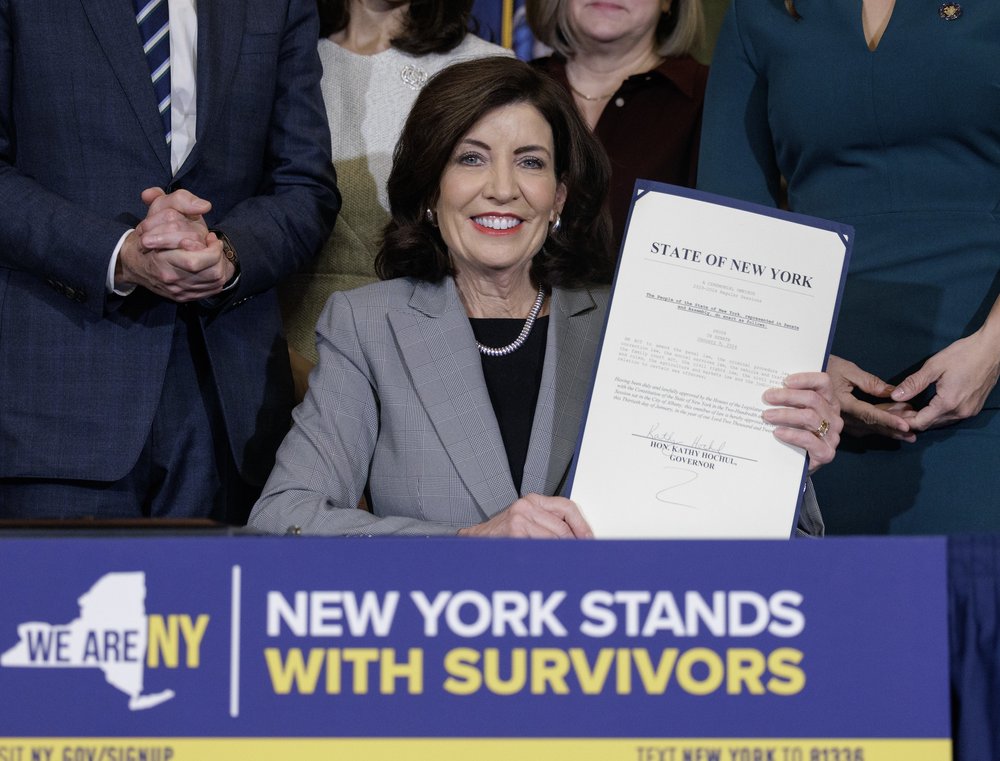New NY laws in 2025: Minimum wage hike, MTA fare evasion fees and more
Dec. 31, 2024, 6:01 a.m.
Here's how new laws could change your health care costs, driving penalties and parental benefits.

New year, new laws.
A number of new state measures will take effect in New York the moment 2024 rolls into 2025, including a bump in the minimum wage and a revamp of fare-evasion penalties in the New York City public transit system.
Drivers, meanwhile, will be subject to a new point system that governs when their licenses can be suspended, while pregnant women will be in line for mandatory paid time off for prenatal medical visits.
Here’s a look at some of the new laws coming to New York in 2025:
Minimum wage up to $16.50 in NYC
New York’s minimum wage is set to increase again.
The hourly minimum wage for non-tipped workers will hit $16.50 on Jan. 1 in New York City, Westchester County and on Long Island, up from the current $16.
In the rest of the state, it’ll be $15.50, up from $15.
It’s the second of three yearly increases Hochul and lawmakers approved in the 2023-24 state budget. In 2026, the wage will increase to $17 downstate and $16 in the rest of the state.
Beginning in 2027, future increases in the minimum wage will be automatically tied to the rate of inflation — though the governor’s budget office could step in to block them in poor economic conditions.
MTA fare evasion fees
The new year also brings new fines for people who skip out on New York City subway or bus fares.
The current fine for someone who jumps the turnstile or boards a bus without paying is $100 each time a person is ticketed. Starting Jan. 1, that changes thanks to a new state law.
First-time violators will be issued a written warning rather than a summons. Second-time violators face a $100 fine — but if they pay in full by the due date, the MTA will issue them a $50 fare card to use. After that, the fine jumps to $150 for each subsequent violation.
Each violation falls off a person’s record after four years.
Those who are enrolled in the city’s Fair Fares program for lower-income New Yorkers would be subject to half-priced fines. A person who is eligible for the program but hasn’t yet enrolled can have their fines waived if they decide to enroll.
The MTA estimates fare evaders skipped out on about $600 million in bus and subway fares in 2022.
DMV points overhaul
Drivers who violate New York’s traffic laws will face a newly overhauled penalty system.
Starting Jan. 3, the state DMV will begin enforcing its new point structure — which assigns a certain number of penalty points to each driving violation that, when accumulated over time, can result in a driver’s license being suspended.
Under the new structure, many violations will carry a stiffer punishment.
Driving under the influence and other similar charges are worth 11 points, along with all the other penalties already associated with them. They didn’t carry any points before, though they generally include a mandatory license suspension.
Leaving the scene of an accident with a personal injury is a 5-point penalty, up from 3 points, while illegally passing a stopped school bus will be 8 points, up from 5.
Under the new system, a driver’s license can be suspended if they get 11 or more points — or 9 points from speeding tickets — over two years. Previously, it was 11 points over an 18-month period.
Insulin copay ban
Starting Jan. 1, New York residents on certain health plans will no longer have to pay copays for insulin.
Hochul and lawmakers approved the ban on copays, coinsurance and other cost-sharing for the diabetes drug as part of the state budget in April.
The new law doesn’t apply to all health insurers — just the individual, small-group and large-group policies the state regulates. Many large-scale, employer-sponsored health plans are regulated by the federal government.
All told, about 60,000 New Yorkers are expected to benefit from it, according to the state Department of Financial Services. The state Department of Health estimates 1.8 million people in the state have diabetes, though many of them are on Medicaid plans that require little or no out-of-pocket costs for insulin.
The ban kicks in once your health plan is up for renewal after Jan. 1. It builds on the state’s previous limit on insulin copays, which was $100 a month.
Prenatal leave for pregnant workers
Pregnant New Yorkers — or, in some cases, those who are trying to become pregnant — will be eligible for 20 hours of paid leave for prenatal care starting in 2025.
The new policy, approved as part of the state budget in the spring, will allow patients to use the leave on a variety of appointments and procedures, including physical exams, testing, talks with their doctors and fertility treatments, according to Hochul’s office.
The paid leave is for people who work for private employers, both part time and full time. And it’s on top of the state’s paid family leave program, which covers up to two-thirds of a new parent’s salary for 12 weeks after their baby is born. (Public employers in New York already have more generous leave policies, generally speaking.)
The state Department of Labor estimates about 130,000 pregnant women will be eligible each year.
New Yorkers could get a $500 'inflation refund' under Gov. Hochul’s new plan Gov. Hochul asked New Yorkers to send her questions. Here are (some) answers.